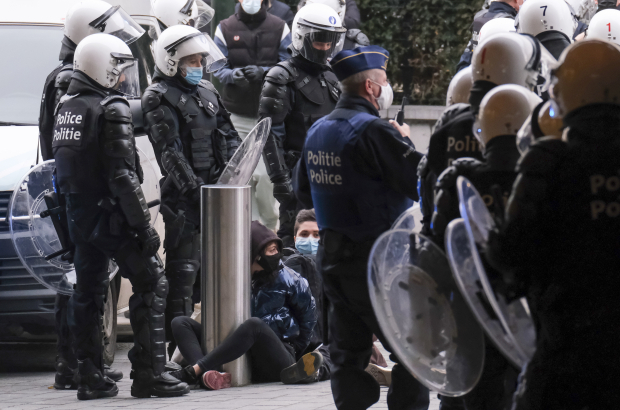- Daily & Weekly newsletters
- Buy & download The Bulletin
- Comment on our articles
Judge rejects parents' collective legal action against alleged police brutality
A Brussels investigating judge has rejected a collective complaint from several parents who denounced police violence against their children on 24 January during a demonstration against "class justice".
The judge has ruled that a collective action cannot go ahead - and that each alleged victim of police brutality must file a separate complaint. Later, the cases could be merged.
"The purpose of our complaint was to ensure that the justice system takes charge of this case and that we can identify the police officers who, on 24 January, beat our teenagers and were violent towards them both physically and verbally but also through racism," said one of the parents.
"We filed a criminal complaint, but also a civil one because we realise that the problem goes much deeper than what happened on 24 January,” he added.
“From our point of view, there is a dysfunction within the police, at least in Brussels. We would like to discover who is responsible for this. We believe that there are problems at the level of the hierarchy of the police and public authorities when it comes to managing this dysfunction."
In its complaint, the parents' collective identified 86 young people who were placed in cells at the Etterbeek barracks on 24 January after the demonstration. About 20 filed a complaint, via their parents.
Their lawyer Joke Callewaert said refusing the collective legal action was unacceptable. "For each of the victims, this is about what happened on 24 January, and about acts committed by the same group of police officers," she said.
"All the detainees were wrongly arrested that day and treated unfairly. The only difference is that not all of them were beaten in the same way."
One of the young people detained on the day said: "We heard about this demonstration, so we went to see. All of a sudden, we were surrounded by the police and arrested. Then we were taken to the Etterbeek barracks. Once there, policemen beat us, they were insulting for no reason. In the barracks, they really wanted to show that they were the strongest.”
“This is intolerable,” he added. “I no longer have any confidence in the police at all. We must make sure that this doesn't happen again. Now we've filed a complaint, we'll see what’s going to happen."
One young woman recalled being held in a cell with more than 20 other people. "The police officers on duty spat on me and made racist comments,” she said. “I always respected the police, but not any more. There was even a 12-year-old girl in jail for six hours, which is not normal. Something must change. And it's not up to us, it's up to the police to do that."
A father representing his 16-year-old son said his child had been pulled from a cell of over 30 people and beaten by officers with one allegedly telling his son: "You young people never know what you've done, it's never your fault."
"First of all, I hope that violence is seen as no longer being acceptable,” the father said. “Police brutality is not a new issue, but often people are isolated and afraid to say anything. We're a collective now, that's essential. I hope that the process will set something in motion and have a healing effect on the relationship between the citizens and the police. Because my son is afraid of the police today."
Another mother, whose 17-year-old daughter was arrested while on her way to catch the Metro, said that police brutality is not new and that groups such as the Collectif des Madres from Saint-Gilles, have been denouncing the problem for years. "It often happens to families from less privileged neighbourhoods of Brussels," she said. "But this time there happens to be a few parents with good contacts in the media and justice system."
"The demonstration has masterfully highlighted this problem," said Patricia van der Smissen, one of the lawyers. "It is interesting to see the testimonies: many complaints come through white parents, although there are also families with a migration background."
The demonstration against "class justice" took place at the Mont des Arts in Brussels. It was organised by some 20 organisations, which wanted to express their displeasure at a series of incidents in which the police allegedly abused their authority and used disproportionate force. The demonstrators held placards and chanted for justice over several recent deaths allegedly caused by police actions and negligence.
Despite the demonstration not being authorised, the police allowed the rally to take place for about 45 minutes before asking people to leave. While many of the estimated 145 demonstrators dispersed, others moved towards the square in front of Central Station to continue the protest. Police then moved in, arresting a total of 245 people, including 86 minors.
In the following days, various accounts circulated online and in the media that the police had been unnecessarily violent during and after the arrests of protestors and by-standers who claimed that they had just been caught up in the police operation.
A group of parents of several of the arrested minors then filed a complaint with Committee P, the oversight body of the police, leading to the Brussels prosecutor's office opening an investigation.
In addition, a police union also denounced the violent behaviour of some police officers during the demonstration. The CGSP union, which was responding to complaints by police officers against colleagues, said it found that procedures were not followed during the arrests.



















